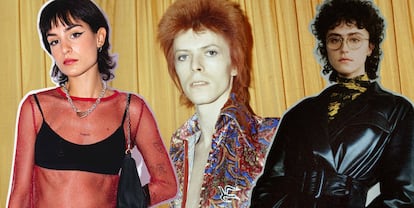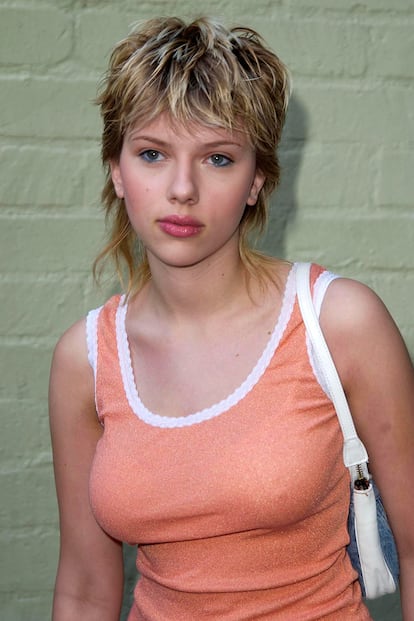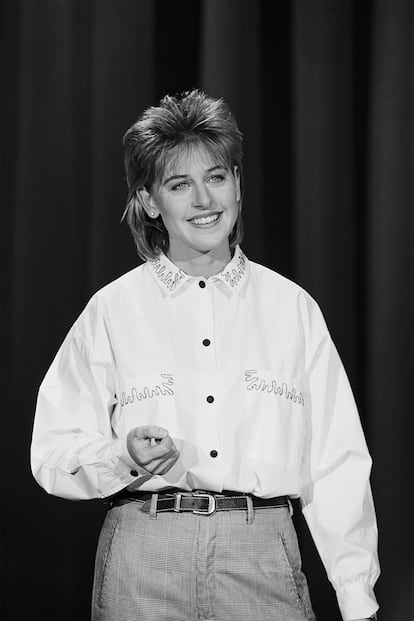Mullet revival? The 1980s haircut that is sweeping TikTok
The much-ridiculed style is trending again after celebrities, singers and models began sporting the look

Ella Emhoff, stepdaughter of Kamala Harris, parading for Proenza Schouler. The young Spanish singer-songwriter Natalia Lacunza. Gigi Hadid on the cover of Vogue. The rapper Lil Nas X and the singer of Amyl and the Sniffers.
What this motley list of names has in common is a haircut: the mullet. Throughout history, the “business in the front, party in the back” look has been popularized by groups as opposed as American rednecks and queers in the 1970s and 1980s. But in recent decades it has been mutating. Sometimes it is just an aesthetic decision, other times it’s political or about music. In 2022, social media apps like TikTok are a cause in themselves: the challenge #oneminutemullet, in which users cut their own hair with kitchen scissors, has accumulated 92.8 million views.
Dating back to Egypt and Greece, where it was worn by warriors taking advantage of the visibility of short bangs and the protection from the sun of the longer shag, and immortalized by the Beastie Boys in the 1994 song Mullethead, there is no single cause behind the new trend. In its 2022 predictions report, Pinterest filed it under “rebel cuts” as one of the most buzzed-about hairstyles among Generation Z. Searches for inspirational images about mullets on the platform increased 190% over the previous year.
“I hadn’t thought about why I wear it until you asked me the question,” the illustrator and comic book artist Carla Berrocal admits over the phone. She’s had this cut for three years, and the first time she had it done, in 2019, was in Rome while doing her artistic internship at the Academy of Spain. “I had never had much sensitivity for aesthetics, but living with fashion people and being in Rome, which breathes aesthetics everywhere, I sought a change.” She asked for advice from a fellow designer, whose taste is “very Italian and sophisticated,” and she suggested doing something “Bowie-like” with her hair. “There they used to cut it very well, with a razor, which made it more uneven. Now they do it with scissors but I still wear it.”

For Berrocal, the mullet is glam and 1980s, an element of her image, in which her big aviator glasses and vintage shirts also evoke that era. But if there is one thing about this haircut, as stylist Guido Palau, creator of the hairstyles that dominated Alexander McQueen’s spring 2022 fashion show, pointed out to The New York Times, it is that it has always “provoked such strong reactions because it refuses to be just one thing, it is somewhere between long and short, masculine and feminine, tasteful and tacky.”
René Zamudio, designer, stylist and creative thesis director at the European Institute of Design (IED) in Barcelona, agrees: “I myself wore it at the end of the 1970s when, with Bowie, it was extrapolated to the world of fashion. It’s funny because I’ve always thought it was an ugly cut, but you get used to it until you eventually come to like it.”
In the United States the return of the mullet in recent years has been associated “with Trumpism and the vindication of the redneck lifestyle. Fashion has reappropriated it as a form of mockery and reduction of power,” the sociologist, gender and diversity consultant and social researcher Marina López Baena told this newspaper. But in countries like Spain, she says, it is often associated with marginalized social groups. That change of cultural perspective was experienced by Berrocal when she returned from her stay in Rome: “I realized that here the mullet had that connotation. I don’t like the idea of romanticizing a social class. For me the reference is still Bowie.”
“It’s Basque too!”, adds Carla’s roommate. The illustrator explains how Spaniards also associate the mullet with the look favored by Basque nationalists in northern Spain, something that has cost her mockery and unfortunate comments on social media. Esther Galván, a photographer, has dealt with similar remarks, but she says she has the feeling that the haircut, which has been “a sign of identity of many social movements and within music,” has been losing part of its meaning as it has become increasingly fashionable. In her case, wearing it again in a more seventies version and closer to the shaggy or wolf cut (longer and with a mane shape) has meant a reconciliation and also a liberation from the flat iron.
“Hair has always been about identity for me but not as something premeditated like: ‘Now I’m going to shave my head because I want to break gender roles.’ It has simply been one more way of expressing myself, just like when I have tattooed myself or dressed in one way or another,” adds Galván.

“In fashion environments, the mullet is an element that allows you to show that you are on the cutting edge. In punk or queer spaces, it’s more of a self-referential element, allowing you to identify yourself within the community,” notes the sociologist López Baena. Hair as a means of expression, of reinforcing one’s own identity and sign. In the LGTBQ+ community, and particularly in the case of lesbian culture and butch aesthetics, which reappropriates traditionally masculine elements such as short hair, the mullet has played this role.
“I cut out all the photographs I could find of Keith Richards. I studied them for a while, grabbed the scissors and scissored my way out of the folk era,” wrote Patti Smith in Just Kids, detailing how improvising a mullet in a silly moment meant a before and after in her career. “When we went to Max’s, my hairstyle caused a sensation. I couldn’t believe the interest it sparked. Even though I was still the same person, suddenly my social status improved.” At Max’s Kansas City (the New York joint considered the birthplace of punk), Smith recounts how someone asked her if she was androgynous. “I thought the word meant beautiful and ugly at the same time. Whatever it meant, with a hairstyle like that, I miraculously became androgynous overnight.”
That is precisely the effect sought on many other occasions. In a context in which especially younger generations understand gender and identity in a more fluid way, the search for the androgynous and non-binary is another of the reasons that leads to try these cuts. Aroa Ay, a tattoo artist and a member of the band Shego, sported a mullet for two years, during which she or her friends cut her hair: “I did it because I thought it was very cool, with a very eighties style and also quite androgynous. Besides, I find it very comfortable. You have the feeling of wearing it short when in reality it’s growing at the back.”
The Covid confinement led to new examples of this cut that lends itself so well to do-it-yourself maintenance. Ella Emhoff, model, artist and designer, attacked her curls, scissors in hand, inside her Brooklyn apartment, giving life to the mullet with which she would later take to the catwalks. Miley Cyrus followed suit: “I only had one option and I needed it,” she said. That option was her mother reproducing the only haircut she knows how to do: the same one her father, Billy Ray Cyrus, wore in the late 1980s and early 1990s, in which the mullet became popular, losing its contentious strength and going on to grace movie stars like Patrick Swayze.
“Over time, the mullet lost that peripheral and rebellious edge, it lost the strength to stand up to society that it once had. And I think that this has been influenced by social media, which turn everything into a trend very quickly,” reflects René Zamudio. Not as subversive as it once was, the mullet has nevertheless not lost its ability to generate conversation.
Tu suscripción se está usando en otro dispositivo
¿Quieres añadir otro usuario a tu suscripción?
Si continúas leyendo en este dispositivo, no se podrá leer en el otro.
FlechaTu suscripción se está usando en otro dispositivo y solo puedes acceder a EL PAÍS desde un dispositivo a la vez.
Si quieres compartir tu cuenta, cambia tu suscripción a la modalidad Premium, así podrás añadir otro usuario. Cada uno accederá con su propia cuenta de email, lo que os permitirá personalizar vuestra experiencia en EL PAÍS.
¿Tienes una suscripción de empresa? Accede aquí para contratar más cuentas.
En el caso de no saber quién está usando tu cuenta, te recomendamos cambiar tu contraseña aquí.
Si decides continuar compartiendo tu cuenta, este mensaje se mostrará en tu dispositivo y en el de la otra persona que está usando tu cuenta de forma indefinida, afectando a tu experiencia de lectura. Puedes consultar aquí los términos y condiciones de la suscripción digital.








































